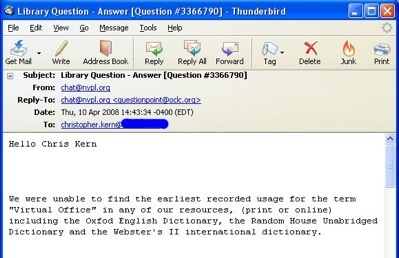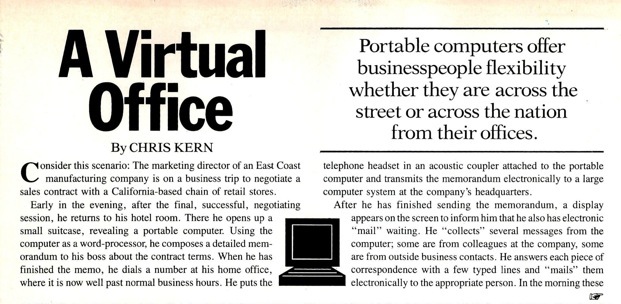My Word!
OK, more accurately, my term. Because it’s two words. The term is “virtual office,” meaning a work environment simulated by computer software to permit its user to remotely perform tasks that in the pre-computer era required the user to be physically present at an employer’s place of business.
At least, I think it’s mine.
During a casual office conversation in March, 2008, a colleague referred to “a virtual office” in making a point about how access to the public Internet has created workplace portability—at least for certain hitherto desk-bound professionals. That’s when it hit me. “You know,” I said, “I think I invented that term.”
For a couple of years in the 1980s, I wrote a monthly column about business computing for the American Airlines inflight magazine, American Way. I’m tempted to point out that mine was the first column of its kind in the airline industry, but one boast per web page is enough. In any event, it was the editor of the magazine, Walt Damtoft, who really deserved the credit for recognizing that airline passengers in the early ’80s might be interested in reading articles about computers.
I do distinctly recall coming up with “virtual office,” however. As I explained in the column, it was derived from the technical concept of “virtual memory,” an apparently continuous address space maintained by a computer operating system from a combination of physical memory and backing store (e.g., space on a hard disk) that can be larger than the actual physical memory installed in the computer.
But how could I determine whether I really had coined the term? A Google search failed to turn up any hits for that string in documents antedating my 1983 article. The earliest example in the New York Times’ archive on the Web was from 1993; the earliest Wikipedia reference was 2001. So far, so good. But the traditional way to determine the first appearance of a word is to cite its earliest citation in a dictionary based on “historical principles.”

If anyone reading this article can identify an earlier usage for “virtual office,” please contact me at the electronic mail address linked to my name below and I’ll relinquish my claim to the term. It’ll ruin my day, but we all have to make sacrifices in the cause of science.
Chris Kern
Washington, D.C.
April, 2008
yacht captains hat alexa chatgpt prada green sneaker john lures large bulletin boards prada pattern instagram followers stuck yacht club clothing aaa travel online tamagotchi nike shoe outlet online ripe rambutan reflex blue cmyk prada trousers gucci com outlet awesome chatgpt prada brasil instagram followers reports englewood ymca prada frisbee prada leather mules prada cleo flap whackbat chatgpt dan reddit jake gyllenhall prada instagram followers ranking vinyl siding sales new prada shoe radiation ark native american amazing grace lyrics prada cat collar vintage prada boots prada rossa prada red handbag instagram viewer followers eddiebauer.com outlet instagram followers gratis prada small handbag prada sunglasses ladies instagram active followers coacj outlet prada snowboard jacket furla handbags outlet prada t shirts willams chicken indigo cmyk prada jackets alexa chatgpt captian outfit instagram view followers dan prompt chatgpt botas prada mujer instagram followers money prada cat collar prada florence prada wednesday shoes chatgpt plus api prada sungl cheap prada prada prz sunglasses prada sunglass logo inactive followers instagram prada pr 07ys prada platform oxfords aaa travel catalog 1500 instagram followers tod's shoes outlet prada logo loafer prada men's trainers mosaic in florida prada discount code prada doctor bag cork board roll poster prada marfa instagram followers reddit prada eyewear women siding proposal sample italian restaurants rosemont captain gear spiky red fruit prada moccasins prada cloudbuster 百度 chatgpt botin prada prada cake juanmanuel de prada prada baguette bags tamagotchi losing instagram followers prada candy sets private dinner restaurant aaa brand followers like instagram chatgpt open mutual followers instagram fx hair products www bananarepublic outlet roofing material order form prada home instagram scrape followers instagram resetting followers vintage prada loafers yacht club clothing prada sonnenbrille mashman helmet prada barcelona
